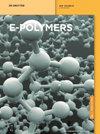Synthesis, characterization and evaluation of a pH-responsive molecular imprinted polymer for Matrine as an intelligent drug delivery system
IF 3.3
3区 化学
Q2 POLYMER SCIENCE
引用次数: 0
Abstract
To address the undesirable reactions associated with matrine (MAT) injection in clinical settings, a high-loading drug delivery system (DDS) based on pH-sensitive molecularly imprinted polymer (MAT@MIPs) was prepared for the first time. The imprinted materials containing recognition sites for the matrine were formed by using carboxyl-functionalized multiwalled carbon nanotubes as a supportive matrix and dopamine as a cross-linker due to its exceptional biocompatibility. Subsequently, the optimal reaction conditions and adsorption performance of MAT@MIPs were systematically investigated. The obtained polymers were characterized and evaluated by Fourier transform infrared spectrometry, scanning electron microscopy, elemental analysis, and thermogravimetric analysis. Results indicated that the MIPs demonstrated a favorable imprinting factor (2.36) and a high binding capacity (21.48 mg·g一种 pH 值响应型分子印迹聚合物的合成、表征和评估,用于将 Matrine 用作智能给药系统
为了解决临床注射马钱子碱(MAT)时出现的不良反应,研究人员首次制备了一种基于pH敏感分子印迹聚合物(MAT@MIPs)的高负载给药系统(DDS)。以羧基官能化的多壁碳纳米管为支撑基质,以生物相容性极佳的多巴胺为交联剂,形成了含有马钱子碱识别位点的印迹材料。随后,对 MAT@MIPs 的最佳反应条件和吸附性能进行了系统研究。傅立叶变换红外光谱法、扫描电子显微镜、元素分析和热重分析对所获得的聚合物进行了表征和评估。结果表明,MIPs 具有良好的压印因子(2.36)和较高的马钱子碱结合能力(21.48 mg-g-1)。在体外研究中,我们在 HepG2 细胞中进行了细胞计数试剂盒-8 试验,然后通过光镜分析验证了 MAT 负载 MIPs 的药物输送能力,并采用超高效液相色谱-质谱同步分析法对培养基中的马钱子碱含量进行了定量。MAT@MIPs 的简易制备为设计高负载和 pH 响应型 DDS 提供了一种可行的解决方案,可为临床应用中需要注射的药物提供一种新的给药方法。
本文章由计算机程序翻译,如有差异,请以英文原文为准。
求助全文
约1分钟内获得全文
求助全文
来源期刊

e-Polymers
化学-高分子科学
CiteScore
5.90
自引率
10.80%
发文量
64
审稿时长
6.4 months
期刊介绍:
e-Polymers is a strictly peer-reviewed scientific journal. The aim of e-Polymers is to publish pure and applied polymer-science-related original research articles, reviews, and feature articles. It includes synthetic methodologies, characterization, and processing techniques for polymer materials. Reports on interdisciplinary polymer science and on applications of polymers in all areas are welcome.
The present Editors-in-Chief would like to thank the authors, the reviewers, the editorial staff, the advisory board, and the supporting organization that made e-Polymers a successful and sustainable scientific journal of the polymer community. The Editors of e-Polymers feel very much engaged to provide best publishing services at the highest possible level.
文献相关原料
公司名称
产品信息
阿拉丁
Matrine
 求助内容:
求助内容: 应助结果提醒方式:
应助结果提醒方式:


